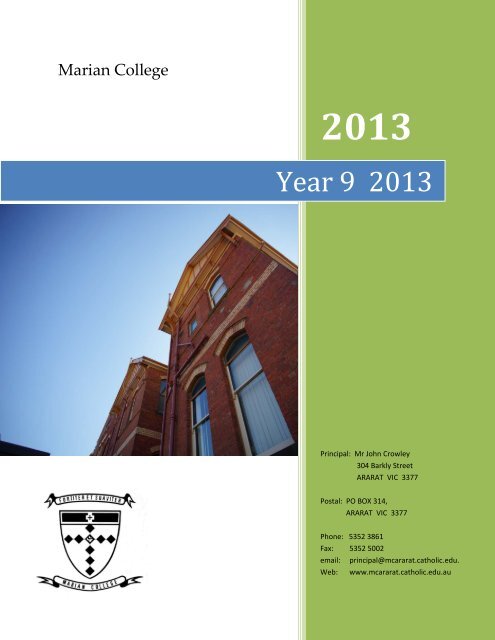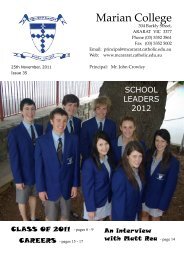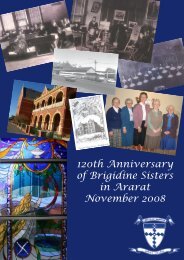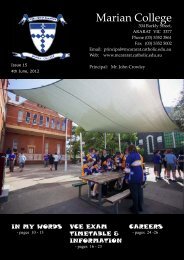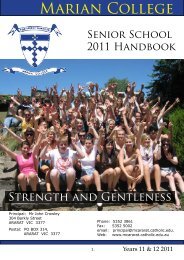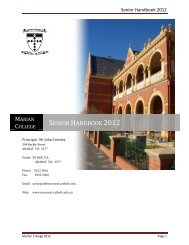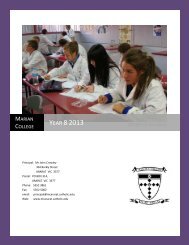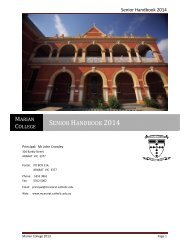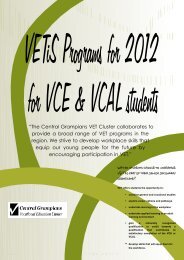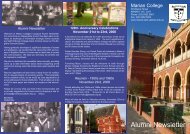Year 9 2013 - Marian College
Year 9 2013 - Marian College
Year 9 2013 - Marian College
Create successful ePaper yourself
Turn your PDF publications into a flip-book with our unique Google optimized e-Paper software.
<strong>Marian</strong> <strong>College</strong><br />
<strong>2013</strong><br />
<strong>Year</strong> 9 <strong>2013</strong><br />
Principal: Mr John Crowley<br />
304 Barkly Street<br />
ARARAT VIC 3377<br />
Postal: PO BOX 314,<br />
ARARAT VIC 3377<br />
Phone: 5352 3861<br />
Fax: 5352 5002<br />
email: principal@mcararat.catholic.edu.<br />
Web: www.mcararat.catholic.edu.au<br />
1
<strong>Year</strong> 9 <strong>2013</strong><br />
Contents<br />
Welcome to <strong>Year</strong> 9, <strong>2013</strong> .............................................................................................................................. 4<br />
The <strong>Year</strong> 9 Course of Study ........................................................................................................................... 5<br />
2<br />
Core Subjects ............................................................................................................................................ 5<br />
Electives .................................................................................................................................................... 5<br />
Core Subjects ................................................................................................................................................ 6<br />
Religious Education ................................................................................................................................... 6<br />
English ....................................................................................................................................................... 6<br />
Science ...................................................................................................................................................... 6<br />
Mathematics ............................................................................................................................................. 7<br />
Health & Physical Education ..................................................................................................................... 7<br />
History ....................................................................................................................................................... 7<br />
Electives ........................................................................................................................................................ 8<br />
Art ................................................................................................................................................................. 8<br />
Drama ........................................................................................................................................................ 8<br />
‘Lights, Set Action’ ..................................................................................................................................... 8<br />
Art ............................................................................................................................................................. 8<br />
Drawing ..................................................................................................................................................... 8<br />
Ceramics .................................................................................................................................................... 9<br />
Digital Photography .................................................................................................................................. 9<br />
Popular Music Studies ............................................................................................................................... 9<br />
Visual Communication and Design ........................................................................................................... 9<br />
Technology .................................................................................................................................................. 10<br />
Materials- Wood & Plastics 1 &/or 2 ...................................................................................................... 10<br />
Metal & Engineering 1 &/or 2 ............................................................................................................... 10<br />
Systems (Mechatronics) .......................................................................................................................... 10<br />
Textiles .................................................................................................................................................... 11<br />
Cooking For Celebrations ........................................................................................................................ 11<br />
Multicultural Cooking.............................................................................................................................. 12<br />
Jewellery ................................................................................................................................................. 12<br />
Physical Education ...................................................................................................................................... 12<br />
Games of the World ................................................................................................................................ 12
<strong>Year</strong> 9 <strong>2013</strong><br />
Netball Studies ........................................................................................................................................ 12<br />
Humanities .................................................................................................................................................. 13<br />
Stand Up .................................................................................................................................................. 13<br />
Geography ............................................................................................................................................... 13<br />
Indigenous Studies .................................................................................................................................. 13<br />
English/Maths ............................................................................................................................................. 14<br />
Literature ................................................................................................................................................ 14<br />
Living Skills .............................................................................................................................................. 14<br />
Maths in Sport ......................................................................................................................................... 14<br />
LOTE ............................................................................................................................................................ 14<br />
Mandarin ................................................................................................................................................. 14<br />
<strong>Year</strong> 9 <strong>2013</strong> Subject Selection ................................................................................................................... 17<br />
3
<strong>Year</strong> 9 <strong>2013</strong><br />
Welcome to <strong>Year</strong> 9, <strong>2013</strong><br />
The following pages have been prepared to help you choose the elective units you will undertake in <strong>Year</strong> 9. <strong>Year</strong> 9<br />
is an opportunity for students to choose subject areas that interest them in the form of electives, whilst still<br />
maintaining the integral core subjects of English, Mathematics, Science, Religion and Health and Physical<br />
Education. In <strong>2013</strong> History is being introduced as a core subject. The retention of these core subjects through to<br />
the end of <strong>Year</strong> 10 is to ensure that students do not reduce their options when choosing a VCE Course and/or a<br />
future career path.<br />
Eight (8) elective units are to be selected at <strong>Year</strong> 9: four per semester by two semester. However, if students<br />
choose Mandarin, this covers two elective blocks as it runs for the full year. Students must choose at least two<br />
subjects from each of Technology and the Arts<br />
<strong>Year</strong> 9 is an exciting and important year in the intellectual, physical and social emotional development of our<br />
young people and <strong>Marian</strong> <strong>College</strong> strongly encourages all students to make the most of every learning opportunity<br />
made available to them. It is often through leaving one’s comfort zone and trying something new that a new talent<br />
or ability is identified or a lifelong hobby or interest developed.<br />
Careful consideration should be given to the selection of electives and subject outlines need to be read carefully.<br />
Please note that if Mandarin is not chosen, it cannot be taken up again in <strong>Year</strong> 10 or beyond. If you are unsure<br />
about what electives your child/ren should choose, please make contact with the Head of Curriculum or your<br />
child’s subject teachers.<br />
Mr. John Crowley<br />
Principal<br />
4
The <strong>Year</strong> 9 Course of Study<br />
All <strong>Year</strong> 9 students must study the following subjects in <strong>2013</strong>.<br />
Core Subjects<br />
Religious Education (4 periods per cycle)<br />
English<br />
(6 periods)<br />
Mathematics<br />
(6 periods)<br />
Science<br />
(5 periods)<br />
Physical Education & Health(5 periods)<br />
History<br />
(3 periods)<br />
Electives<br />
The following elective units will be offered and will<br />
run if sufficient students choose them.<br />
Units<br />
THE ARTS<br />
Drama<br />
Lights Set Action<br />
Art<br />
Drawing<br />
Ceramics<br />
Digital Photography<br />
Popular Music Studies<br />
Visual Communication & Design<br />
TECHNOLOGY<br />
Materials – Wood & Plastics 1&/or 2<br />
Metal & Engineering 1&/or 2<br />
Systems Mechatronics<br />
Textiles<br />
Cooking for Celebration<br />
Multicultural Cooking<br />
Computer Studies<br />
The Fabric of Community<br />
Jewellery (Art)<br />
HEALTH & PE<br />
Games of the World<br />
Netball Studies<br />
HUMANITIES<br />
Stand Up<br />
Geography<br />
Indigenous Studies<br />
ENGLISH / MATHS<br />
Literature<br />
Living Skills<br />
Maths in Sport<br />
LOTE<br />
Mandarin<br />
5
Core Subjects<br />
Religious Education<br />
Course Description<br />
<strong>Marian</strong> <strong>College</strong> is a Brigidine school, established by a<br />
group of sisters whose central goal was to provide<br />
education, especially Religion. Today we try to continue in<br />
this same spirit by embracing the Brigidine Core Values<br />
and Awakenings Curriculum that will engage all students.<br />
At <strong>Year</strong> 9 students study four units of work. These are:<br />
1. Who is Jesus?<br />
2. Death and New Life<br />
3. Stewardship<br />
4. Eucharist<br />
All students are also involved in the understanding and<br />
presentation of The Stations of the Cross, which takes<br />
place in Term One.<br />
Assessment<br />
1. Assignment – Religious Belief comparison<br />
2. Images of Christ – A portfolio of annotated pictures<br />
3. A guided prayer session/liturgy<br />
4. Workbooks and Participation<br />
English<br />
Course Description<br />
All English courses focus on developing students’<br />
knowledge, understanding and skills in listening, reading,<br />
viewing, speaking, writing and creating.<br />
Listening, Reading and Viewing<br />
Students read and view a wide range of texts, including<br />
novels, short stories, poetry, films and print media. They<br />
analyse and explain how images, vocabulary choices and<br />
language features distinguish the work of individual<br />
authors. Students select evidence from the text to analyse<br />
and explain how language choices and conventions are<br />
used to influence an audience.<br />
Speaking, Writing and Creating<br />
Students understand how to use a variety of language<br />
features to create different levels of meaning. They<br />
understand how interpretations can vary by comparing<br />
their responses to texts to the responses of others. In<br />
creating texts, students demonstrate how manipulating<br />
language features and images can create innovative texts.<br />
Students create texts that respond to issues, such as news<br />
articles, personal/reflective pieces, formal essays and<br />
creative narratives. They make presentations and<br />
contribute actively to class and group discussions. They<br />
edit for effect, selecting vocabulary and grammar that<br />
contribute to the precision and persuasiveness of texts<br />
and using accurate spelling and punctuation.<br />
Assessment<br />
Students are assessed on the key skills of reading, writing,<br />
and speaking and listening. To demonstrate their level of<br />
competence, students create a range of written texts for<br />
specific purposes and audiences. They draw on a range of<br />
textual sources for their written work. Students also<br />
demonstrate their knowledge and understanding through<br />
oral presentations.<br />
Science<br />
Course Description<br />
This course will help students to become scientifically and<br />
technologically literate citizens who will be able to make<br />
decisions about their lifestyle, their environment and the<br />
kind of society in which they wish to live. Students will see<br />
the connections between science and people, and be<br />
aware of the impact of science and technology on society,<br />
the individual and the environment. Curiosity and a spirit<br />
of inquiry that helps students to be open-minded and<br />
value objectivity will be encouraged.<br />
Assessment Tasks<br />
Semester One<br />
• Consumer Science<br />
• Matter<br />
• Investigating Chemical Reactions.<br />
Semester Two<br />
• The Heart, Lungs and Circulation, Body Balance,<br />
Digestive System,<br />
• Nutrients and Chemicals in food<br />
• Flight<br />
• Properties of Light & the eye.<br />
• Earth and Space<br />
6
<strong>Year</strong> 9 <strong>2013</strong><br />
Mathematics<br />
Course Description<br />
Students have the opportunity to work at their own pace<br />
in <strong>Year</strong> 9 Maths with Self Directed Learning a key concept.<br />
Students are given a unit outline at the start of each topic<br />
and it is their responsibility to work through this at their<br />
own pace, acquiring help when necessary.<br />
Students are required to complete Assessment Tasks<br />
throughout each unit to ensure their understanding of the<br />
content is at a <strong>Year</strong> 9 level. It is an expectation, that<br />
homework is attempted every night for a minimum of 20<br />
minutes.<br />
The use of technology, including calculators and<br />
computers, will be integrated into the course.<br />
Assessment<br />
The assessment of each unit of work will be by means of<br />
class test(s) and may also include activities, problems or a<br />
project.<br />
Semester One<br />
1. Measurement<br />
2. Pythagoras Theorem<br />
3. Trigonometry<br />
4. Expanding and Factorising<br />
Semester Two<br />
1. Geometry<br />
2. Surds<br />
3. Linear Equations<br />
4. Statistics/ Chance and Data<br />
Health & Physical Education<br />
Course Description<br />
A healthy, physically active lifestyle is conducive to more<br />
effective participation in all that society has to offer and<br />
greater levels of success within and beyond school. This<br />
requires students to develop the knowledge, skills and<br />
behaviours that enable them to:<br />
•Maintain good health and live a healthy lifestyle<br />
•Understand the role of physical activity in ensuring good<br />
health<br />
•Engage in physical activity<br />
In <strong>Year</strong> 9 students continue develop proficiency in a range<br />
of high-level movement and manipulative skills, and focus<br />
7<br />
on identifying and implementing ways of improving the<br />
quality of their performance during games, physical<br />
activities and sports.<br />
Course content<br />
Swimming/Lifesaving<br />
Personal Identity<br />
Athletics<br />
Supa netball<br />
Health & Illness in Australia<br />
Sofcrosse<br />
Food & The Environment<br />
Promoting Active Lifestyles<br />
Assessment<br />
• Participation & Motivation<br />
• Skill Development<br />
• Interpersonal Skills<br />
• Written Tasks<br />
History<br />
Course Description<br />
Soccer<br />
Racquetball<br />
Sexual Health<br />
Risk Taking<br />
Fitness testing<br />
Volleyball<br />
Table tennis<br />
In line with the new Australian Curriculum the first topic<br />
that is studied in Yr 9 History is the Industrial Revolution.<br />
The <strong>Year</strong> 9 curriculum provides a study of the history of<br />
the making of the modern world. Students will learn a<br />
range of new skills that will assist with their study of<br />
modern civilizations, including key evidence, concepts and<br />
features of the modern world.<br />
The focus in Semester 2 is on Asia and the World and<br />
World War I. Students will learn all about the extent of<br />
European imperial expansion, including the Asian region<br />
and the emergence and nature of economic, social and<br />
political ideas from the period.<br />
Assessment Tasks<br />
1. Mapping Activity -Students will create a detailed<br />
map showing the significant events of the period<br />
in question.<br />
2. Timeline Activity - Students will learn about the<br />
importance of time and scale and will present a<br />
detailed timeline of the modern world.<br />
3. Research Project. - Students will investigate<br />
thoroughly one of the key emerging ideas from<br />
the period, choosing from an economic, social or<br />
political idea.
<strong>Year</strong> 9 <strong>2013</strong><br />
Electives<br />
Art<br />
Drama<br />
(Duration:One semester)<br />
Course Description<br />
This unit aims to explore the process of play<br />
production from the pre-rehearsal through to the<br />
post-production stage. This course will incorporate<br />
dramatic skills such as auditioning, script reading<br />
and characterisation, as well as a variety of<br />
stagecraft areas such as directing, acting, costume<br />
design, set design, lighting and sound design.<br />
Course Content<br />
• Script reading and selection<br />
• Audition techniques<br />
• Characterisation<br />
• Stagecraft workshops<br />
• Rehearsal and performance of a One Act Play<br />
Assessment<br />
• Journal<br />
• Stagecraft Folio<br />
• Performance Reviews<br />
• Stagecraft Reviews<br />
• Production of a One Act Play<br />
IV. Promotions and Publicity: Poster and program design<br />
V. Lighting and sound design<br />
Assessment:<br />
1.Folio<br />
2. Practical: Logbook<br />
3. Evaluation.<br />
Art<br />
(Duration:<br />
One semester)<br />
This Unit builds on the ground work already laid in <strong>Year</strong><br />
7 & 8 and prepares students for VCE Art. There is a<br />
heightened expectation of an annotated visual diary<br />
with emphasis on thoughts and ideas being presented in<br />
both written and visual forms.<br />
Through examination of important artworks,<br />
movements and artists, appropriate language for<br />
discussing, comparing and analysing work will be<br />
developed during this elective. The unit is designed to<br />
stimulate creativity, encourage problem-solving and<br />
make the students aware of the broad range of<br />
mediums and techniques that are available to them.<br />
Assessment Tasks<br />
• Class-based topics.<br />
• Assignment work.<br />
• Visual diary development.<br />
‘Lights, Set Action’<br />
(Duration: One semester)<br />
Drawing<br />
(Duration:<br />
One semester)<br />
Students to undertake a practical class that helps design,<br />
plan and create (build/sew/paint/design) elements of the<br />
school production in consultation with the Director and<br />
other specialist staff.<br />
The subject requires commitment, independence and<br />
creativity.<br />
This subject encourages skills such as communication,<br />
teamwork, collaboration, design, problem solving,<br />
negotiation, budgeting, commitment and community<br />
service.<br />
The purpose of this course is to learn the fundamentals of<br />
drawing accurately through the five basic skills of<br />
drawing. These simple steps are designed for success.<br />
Once these have been achieved students will practice by<br />
using these skills to develop refined drawing and<br />
observation. Students can use these skills for life and still<br />
life sketching, Comic or Manga art.<br />
Assessment Tasks<br />
• Class-based topics.<br />
• Home drawing.<br />
• Visual diary development.<br />
The course would include some/all of the following<br />
I. Costume design and construction<br />
II. Set Design and construction/painting<br />
III. Properties design/collection/construction<br />
8
<strong>Year</strong> 9 <strong>2013</strong><br />
Ceramics<br />
(Duration:<br />
One semester)<br />
Popular Music Studies<br />
(Duration:One semester)<br />
Course Description<br />
Ceramics is one of the most enduring of all the arts and<br />
proof of its production is stamped across the history of<br />
civilization. Ceramics reflects both technological and<br />
cultural progress across the millennia and it is evident<br />
from pre-history to the present. The need for creating<br />
beautiful objects in clay will prevail. Ceramics provides us<br />
with the complete hand and mind art activity satisfying<br />
both creative and manipulative skills. Ceramics also<br />
requires simple understanding of science, chemistry and<br />
logic.<br />
Learning in Ceramics allows students to:<br />
• Develop manipulative skills that can be imaginative<br />
and expressive.<br />
• Develop creative skills within the constraints of<br />
ceramic materials and technology.<br />
• Analyze and understand their own work in the<br />
context of an ancient art form and reflect on the<br />
purpose and function for which ceramic works are<br />
created.<br />
• Understand the science of the physical properties of<br />
ceramic materials.<br />
• Use appropriate ceramic language and terminology.<br />
Assessment Tasks<br />
• An ongoing journal in the form of a visual diary<br />
• Self generated work.<br />
Digital Photography<br />
(Duration: One semester)<br />
Course Description<br />
Digital imaging is an ART subject. Therefore an Art<br />
perspective will be taken to the teaching and learning<br />
strategies used throughout the unit. Being an Art subject,<br />
creativity and artistic expression are of paramount<br />
importance. By studying the work of Digital<br />
photographers and artists and experimenting with the<br />
rules of photography students develop a digital folio of<br />
images.<br />
Digital imaging does however use a range of advanced<br />
technical hardware and software, the use of which needs<br />
to be learned. Technical proficiency is needed to<br />
efficiently use the technology in the creation of digital<br />
art.·<br />
Assessment Tasks<br />
• Digital Portfolio<br />
• Assessment tasks.<br />
Course Description<br />
Popular Music Studies explores the history and<br />
development of popular music in western culture,<br />
focusing particularly on the development of Ragtime,<br />
Blues, Swing, Jazz, Rock ‘n’ Roll and beyond. Students<br />
research and discuss the social and political context of an<br />
era and identify the subsequent influences on the Popular<br />
Music culture of the time. This unit also has a significant<br />
practical component, developing guitar and keyboard<br />
skills with a focus on composition and arrangement.<br />
Course Content<br />
• Listening Diary<br />
• Comprehensive history of different genres of Popular<br />
Music<br />
• Major Scales<br />
• Chords and Primary Triads<br />
• Blues Song Structure (12-Bar Blues)<br />
Assessment<br />
• Listening Diary<br />
• Research Assignment and Time Line<br />
• Composition Task and Performance – 12-Bar Blues<br />
Song<br />
• Theory/aural Test<br />
Visual Communication and Design<br />
(Duration: One semester)<br />
Course Description<br />
Visual communication is the communication of<br />
information by visual means. It leads not only into graphic<br />
and commercial art and design areas, but media and<br />
related occupations. This study help students gain an<br />
insight into the design profession. Students will develop<br />
an understanding of the design process from initial ideas<br />
and concept sketches to quality final presentation work.<br />
Course Content<br />
Students will be challenged with solving various real life<br />
tasks presented through design briefs, such as music<br />
festival advertising and product logo design. Freehand<br />
technical drawing and CAD skills will be developed.<br />
Assessment<br />
• Visual diary<br />
• Folio of Assignment work<br />
9
<strong>Year</strong> 9 <strong>2013</strong><br />
Technology<br />
Materials- Wood & Plastics 1 &/or 2<br />
(Duration: One or two semesters)<br />
Course Description<br />
There are three phases involved in the technology<br />
process. These are: investigating/ designing, production<br />
and analyzing/evaluating. Each stage involves research<br />
and the development and application of knowledge, skills,<br />
equipment, materials and information to create useful<br />
products. Students explore various materials. Students<br />
design, produce and evaluate a range of products using<br />
hand and power tools.<br />
Course Content<br />
Investigating and designing: Working from a design brief<br />
students undertake relevant research to generate a range<br />
of options, from which they a select a preferred option.<br />
They then create a realistic production plan to suit their<br />
project.<br />
Producing: Students work safely using a range of tools<br />
(some complex), equipment and procedures with<br />
precision. They apply their understanding of the<br />
properties and characteristics of materials. Students make<br />
products that meet the requirements outlined in their<br />
design brief.<br />
Analyzing and evaluating: Students critically evaluate and<br />
analyse the processes, materials and equipment used<br />
during the production process as part of the overall<br />
evaluation of the end product.<br />
Assessment<br />
1. Design and produce a utility stool<br />
2. Design and production of a clock<br />
3. Assignment on properties of materials<br />
4. Workbook- design exercises, evaluation tasks<br />
and class work<br />
5. Production of a range of products.<br />
Metal & Engineering 1 &/or 2<br />
(Duration: One or two semester)<br />
Course Description<br />
Students explore the social and environmental<br />
implications of using various materials. They start to<br />
recognize that the supply of some materials is limited, and<br />
examine possibilities for reusing and recycling materials.<br />
They use materials tests to determine the<br />
appropriateness of materials for particular purposes.<br />
Students design and produce a range products using hand<br />
and power tools and a range of welding processes.<br />
Course Content<br />
• Design and construct a range of products using<br />
metals<br />
• and metal working skills.<br />
• Safety procedures and concerns<br />
• Oxygen/Acetylene and Arc welding<br />
• Each student constructs a range of metal projects<br />
• Selecting appropriate materials<br />
• Analyzing products with reference to specified<br />
criteria<br />
Assessment<br />
1. Demonstrate competency in the use of a range of<br />
welding and engineering skills<br />
2. Design and produce a range of products<br />
3. Workbook containing designs for production projects<br />
and a record of class-work.<br />
4. Assignment on selecting materials, processes and tools<br />
for particular tasks<br />
Systems (Mechatronics)<br />
(Duration: One semester)<br />
Course Description<br />
Systems Mechatronics combines both Electronic and<br />
Mechanical principles. Students consider the principles,<br />
structure, logic and organisation of systems, and research<br />
how community and industrial standards affect the design<br />
and development of systems.<br />
Students increasingly understand the components of<br />
systems as well as how changes made to inputs and<br />
processes affect output. Students work with a range of<br />
systems, that combine mechanical and electronic<br />
principles ie (Mechatronics)<br />
Course Content<br />
• Basic electrical and mechanical theory – series and<br />
parallel circuits, Ohm’s Law, power, gears, pulleys,<br />
levers, etc. PILAXE programming principles<br />
• Construct and program a micro computer<br />
• Symbology and circuit diagrams<br />
• Construction of a range of projects, eg amplifier<br />
10
<strong>Year</strong> 9 <strong>2013</strong><br />
• Construct and program a PILAXE micro computer<br />
controlled robot<br />
• Programming in PIL basic<br />
Assessment<br />
1. Production of a PILAXE based robot<br />
2. Tests to determine knowledge of underpinning<br />
technical knowledge<br />
3. Work book/folio of theory, design and programming<br />
tasks.<br />
Textiles<br />
(Duration:<br />
One semester)<br />
Course Description<br />
Students continue to develop their fibre and fabric<br />
knowledge and skills and to design and produce a range<br />
of products. They develop their garment construction<br />
skills and commercial pattern knowledge. They also<br />
develop their knitting and/or crotchet skills. Students<br />
explore a range of fabric embellishment and exploratory<br />
manipulation techniques. They work to a design brief and<br />
meet specifications.<br />
Course Content<br />
• Safety in the technology classroom<br />
• Fibre & fabric properties and characteristics<br />
• Knitting and/or crotchet<br />
• Sewing machine and garment construction skills<br />
• Surface manipulation and embellishment eg solvey,<br />
shibori<br />
• Thinking strategies for designing<br />
• The design brief and specifications<br />
• The design process<br />
• Written assignment<br />
Assessment<br />
• Visual diary<br />
• Range of experimental samples<br />
• Garment using a commercial pattern -pyjama or<br />
boxers<br />
• Knitted or crochet product<br />
• Decorated bra<br />
• Written assignment<br />
Fabric of the Community<br />
(Duration: One semester)<br />
Course Description<br />
Using and developing their skills students will create<br />
articles that will be distributed to local community<br />
groups.<br />
Students will conduct research into products (created<br />
from a variety of fibre/fabric) which will be useful to local<br />
community organizations. This could include a skype<br />
interview with other organizations doing similar projects.<br />
Students will use, and build upon, their fabric and fibre<br />
knowledge and skills, to design and produce these<br />
products, either individually or as a group.<br />
Skills could include knitting, crocheting, appliqué, hand<br />
and machine sewing, embroidery<br />
End products may include weighted blankets/vest,<br />
sensory blankets, quilts, knee rugs, kits for foster children<br />
(eg bag, soft toy, quilt)<br />
Course Content:<br />
• Safety in the technology classroom<br />
• Research<br />
• Design Plan<br />
• Construction skill development,<br />
Assessment:<br />
• Research Report<br />
• Visual Diary<br />
• End products (will vary)<br />
Cooking For Celebrations<br />
(Duration: One semester)<br />
Course Description<br />
This unit focuses on planning and preparing for a range of<br />
celebrations involving both traditional and non-traditional<br />
foods – Christmas, friends parties, family birthdays, etc.<br />
Sweet and savoury foods as well as cake decorating are<br />
included.<br />
Course Content<br />
Students study a variety of celebrations and the foods<br />
associated with them. Related cooking methods and<br />
styles are them utilised in the practical component of this<br />
subject.<br />
11
<strong>Year</strong> 9 <strong>2013</strong><br />
Assessments<br />
• Workbook<br />
• Practical sessions<br />
• Assignment – 2 Course Dinner party.<br />
• Assignment – Decorating a ‘Fantasy Cake’.<br />
Multicultural Cooking<br />
(Duration: One semester)<br />
Course Description<br />
In this unit students will experience a range of foods and<br />
cultures from countries other than Australia.<br />
Course Content<br />
In one part of the semester, students study a variety of<br />
cultures which have influences on our eating patterns –<br />
Asian, Thai, Italian, French, Indian etc. Relevant cooking<br />
methods and reasons why certain foods are used are<br />
studied. Each week a typical meal from each country is<br />
prepared.<br />
In the other part of the semester students work in pairs to<br />
research a country of their choice. They complete a major<br />
assignment on this country and present it to the class.<br />
Each pair of students selects an appropriate recipe which<br />
is prepared in the class.<br />
Assessments<br />
• Workbook<br />
• Practical sessions<br />
• Assignment “Tastes of the Globe”<br />
Jewellery<br />
(Duration:One semester)<br />
Course Description<br />
This “hands on” course will develop and expand<br />
• students knowledge of a range of materials<br />
• fine motorskill development<br />
• attitudes to resources and recycling<br />
• cooperative work in a safe environment<br />
Aims<br />
• use and understand a range of natural and man made<br />
materials<br />
• make a series of small beautiful objects<br />
• develop general capabilities of literacy, numeracy,<br />
ICT, creativity, personal competency and intercultural<br />
understanding.<br />
Students will research and make a range of objects<br />
• bracelet, earing, rings, pendant, brooch or necklace<br />
• jewellery box, small container or slumped glass<br />
• wallet, picture frame or mirror<br />
• object from a different culture or era<br />
Students will use a range of “found” or recycled materials<br />
• wood, copper, aluminium, brass and steel<br />
• inner tube, tetra pak and old skateboards<br />
• leather, material, wire and fishing tackle<br />
Physical Education<br />
Games of the World<br />
(Duration: One semester)<br />
Course Description<br />
A healthy, physically active lifestyle is conducive to<br />
more effective participation in all that society has to<br />
offer and greater levels of success within and<br />
beyond school. This requires students to develop<br />
the knowledge, skills and behaviours that enable<br />
them to:<br />
• Maintain good health and live a healthy lifestyle<br />
• Understand the role of physical activity in ensuring<br />
good health<br />
• Engage in physical activity<br />
This subject will enable students to investigate the<br />
variety of games and sports that are played in<br />
various parts of the world. Elements of geography,<br />
history & culture will be learnt along the journey and<br />
plenty of time for hands-on practical sessions of the<br />
various activities.<br />
Course Content<br />
• Games & sports of Europe<br />
• Games & sports of Asia<br />
• Games & sports of South America<br />
• Indigenous games & sports<br />
Netball Studies<br />
(Duration: One semester)<br />
Course Description<br />
A healthy, physically active lifestyle is conducive to<br />
more effective participation in all that society has to<br />
offer and greater levels of success within and<br />
beyond school. This requires students to develop<br />
the knowledge, skills and behaviours that enable<br />
them to:<br />
12
<strong>Year</strong> 9 <strong>2013</strong><br />
• Maintain good health and live a healthy lifestyle<br />
• Understand the role of physical activity in ensuring<br />
good health<br />
• Engage in physical activity<br />
Students will conduct an in-depth analysis of various<br />
aspects of the sport of netball. Practical sessions will<br />
be complemented by theoretical components of the<br />
course.<br />
Course Content<br />
• Teamwork, strategies & tactics<br />
• Attacking & Defensive skills<br />
• Training for netball<br />
• History & culture of netball<br />
• Coaching & umpiring netball<br />
Humanities<br />
Stand Up<br />
(Duration: One semester)<br />
Course Description:<br />
Image and Practise Justice and Service<br />
The world becomes a better place when ordinary<br />
people set out to do good deeds. Inspired by the film<br />
Pay It Forward, this elective encourages student voice<br />
and builds teamwork, community spirit and leadership<br />
through action and applied learning. This is an<br />
opportunity to find ‘your voice’, stand up for what you<br />
believe in, to make a positive difference to something<br />
that interests you.<br />
Students explore different sources of inspiration,<br />
identify issues that interest or excite them, examine the<br />
ideals/principles they stand for, learn how to take<br />
positive action, and carry out student driven<br />
programs/projects that aim to benefit people or<br />
communities.<br />
Course Content<br />
Largely student driven, the interests of participants will<br />
shape the course content of this elective. Students will<br />
have opportunities to consider and act upon school,<br />
community and/or global issues of concern. Over the<br />
course of the semester, they will show evidence<br />
(individually or in groups – large or small) of goalsetting,<br />
planning, skill development, execution and/or<br />
reflection in relation to community project/s.<br />
Assessment<br />
13<br />
• Journal of participation<br />
• Research Assignment<br />
• Report on a proposed or completed community<br />
project<br />
Geography<br />
(Duration:<br />
One semester)<br />
Course Description:<br />
Students enhance their map-making skills by going<br />
out into the schoolyard and beyond to create<br />
successful maps.<br />
Assessment Tasks:<br />
1. Class Exercises: Short textbook-based exercises are<br />
completed in class or for homework.<br />
2. Research Project: Students will research various<br />
factors that lead to endangering animals.<br />
3. The course includes researching and identifying<br />
animals that are endangered and investigating the<br />
main threats to various endangered animals.<br />
4. Atlas activities: Games and quizzes designed to<br />
increase familiarity with major geographic features of<br />
the world.<br />
Indigenous Studies<br />
(Duration:One semester)<br />
Course Description:<br />
Indigenous Studies is a course designed to gain a<br />
greater understanding of Indigenous people and the<br />
role that they have played in shaping Australian<br />
society both in the past and in the present era.<br />
Course Content<br />
The subject will provide an introduction to the<br />
history of Indigenous people and will consider<br />
indigenous food, language, geography, religion,<br />
culture, significant achievements of Indigenous<br />
people and the challenges faced by Indigenous<br />
cultures. The focus of the program will be both local<br />
and Australia wide.<br />
From a Civics perspective, students will study the<br />
importance of promoting Indigenous culture<br />
throughout the local community.
<strong>Year</strong> 9 <strong>2013</strong><br />
Assessment<br />
• Research Assignments<br />
• Presentations<br />
• Personal reflections<br />
• Practical activities.<br />
English/Maths<br />
Literature<br />
(Duration: One semester)<br />
Course Description:<br />
Students read a variety of texts, responding to the view<br />
s and values of the writer. The course also involves a<br />
review of film, focusing on style, technique, directorial<br />
choices and theme. Students also build upon their<br />
formal and creative writing, producing a variety of<br />
written pieces in different styles.<br />
Course will include:<br />
• Excursions to the Melbourne Writer's Festival<br />
• Published authors as Guest Speakers<br />
• Creative Writing<br />
• Writing Competitions<br />
Living Skills<br />
(Duration: One semester)<br />
The main focus of this subject in 2011 will be on everyday<br />
life schools including money management, buying a car<br />
and running a household. Living Skills also aims to offer<br />
extra support in the areas of literacy and numeracy to<br />
students who are experiencing difficulty in their core<br />
studies of English and/or Mathematics. This subject may<br />
be taken over a single semester or a full year.<br />
Course Content<br />
• Writing: filling in forms and writing for different<br />
purposes.<br />
• Reading: Bills/Accounts, Contracts (eg. Mobile phone,<br />
lease agreements, hire purchase, mortgages etc.)<br />
• Oral: telephone courtesy, making complaints and<br />
enquiries, negotiating skills, communicating<br />
effectively.<br />
• Language: emphasis on how to select appropriate<br />
language for particular circumstances.<br />
• Number: using literacy skills in everyday life:<br />
operating a bank account, buying a car,<br />
superannuation, budgeting, interest rates.<br />
• Measurement: developing an understanding of how<br />
measurement is used in everyday situations at home<br />
and in the workplace.<br />
• Homework help: will be offered as needed.<br />
Assessment<br />
Assessments will be in practical formats and may include:<br />
opening a bank account, reports and presentations based<br />
on research into and comparison of interest rates,<br />
contracts, mortgages etc, the ability to fill in forms or<br />
negotiate in person.<br />
Maths in Sport<br />
(Duration: One semester)<br />
Course Description<br />
This subject aims to give students an insight into the any<br />
ways that sport uses Mathematics. In a hands-on<br />
approach, students will have the opportunity to explore<br />
many of the following topics:<br />
Playing fields and area, Decimals & track events, Rock<br />
climbing & Pythagoras’ Theorem, Pool & angles, Diving<br />
formulas, Measuring performance, The Physics of sport,<br />
Sporting strategy, Results, statistics and graphing, Cricket<br />
& averages, Scoring, ranking & percentage, Calculating<br />
speeds, Probability of winning and Creating game<br />
schedules.<br />
This subject aims to bring maths to life and will not only<br />
improve the students’ understanding of maths, but will<br />
also promote and encourage a healthy lifestyle.<br />
LOTE<br />
Mandarin<br />
(Duration: Two semesters)<br />
Course Description<br />
Mandarin at <strong>Year</strong> 9 is an elective subject which covers 2 of<br />
the 8 elective blocks on offer, that is, it runs for the full<br />
year instead of a single semester. The course content is<br />
designed to build upon knowledge and skills learnt in<br />
<strong>Year</strong>s 7 and 8. More specifically the topics are oriented<br />
toward a trip to China, either with the biennial school trip<br />
with other schools in Ararat, or of the student/family’s<br />
own undertaking.<br />
Topics may include:<br />
· Shopping, money and prices<br />
· Asking for and giving directions<br />
· Travelling by bus<br />
14
<strong>Year</strong> 9 <strong>2013</strong><br />
· Chinese holidays and festivals<br />
Assessment Tasks<br />
Written assignments<br />
Oral Activities/Presentations<br />
Projects on China<br />
15
<strong>Year</strong> 9 <strong>2013</strong><br />
16
<strong>Year</strong> 9 <strong>2013</strong> Subject Selection<br />
This form must be returned to <strong>Marian</strong> <strong>College</strong> by Friday 24th August, 2012.<br />
Name:________________________________________________________________________<br />
Core Subjects<br />
o<br />
o<br />
o<br />
o<br />
o<br />
o<br />
Religious Education<br />
English<br />
Maths<br />
Science<br />
Physical Education<br />
History<br />
Electives<br />
Students must choose two subjects<br />
from each of the following:<br />
o<br />
o<br />
o<br />
Art<br />
Technology<br />
Humanities<br />
Art<br />
Drama<br />
Lights Set Action<br />
Art<br />
Drawing<br />
Ceramics<br />
Photography<br />
Popular Music Studies<br />
Visual Communication<br />
Technology<br />
Materials Wood & Plastics 1&/or 2<br />
Metal and Engineering 1&/or 2<br />
Systems – Mechatronics<br />
Textiles<br />
Fabric of Community<br />
Cooking For Celebration<br />
Multicultural Cooking<br />
Jewellery<br />
Health & PE<br />
Games of the World<br />
Netball Studies<br />
Humanities<br />
Stand Up<br />
Geography<br />
Indigenous Studies<br />
English/Maths<br />
Literature<br />
Living Skills<br />
Maths in Sport<br />
LOTE<br />
Mandarin<br />
YEAR 9 <strong>2013</strong><br />
Electives<br />
I am returning to<br />
<strong>Marian</strong> <strong>College</strong> for<br />
<strong>Year</strong> 9 <strong>2013</strong><br />
I am not returning to<br />
<strong>Marian</strong> <strong>College</strong> for<br />
<strong>Year</strong> 9 <strong>2013</strong><br />
Please list your 8 choices in order of<br />
preference.<br />
1._________________________<br />
2. _________________________<br />
3. .________________________<br />
4. .________________________<br />
5. .________________________<br />
6. .________________________<br />
7. .________________________<br />
Parent signature_______________________________________________________________________<br />
Student email address__________________________________________________________________<br />
8. .________________________<br />
If I did not get all choices I would like this subject:<br />
9_________________________<br />
Parents email address__________________________________________________________________<br />
17


